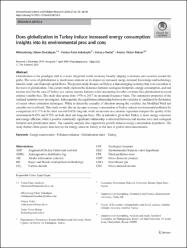| dc.contributor.author | Etokakpan, Mfonobong Udom | |
| dc.contributor.author | Adedoyin, Festus Fatai | |
| dc.contributor.author | Yorucu, Vedat | |
| dc.contributor.author | Bekun, Festus Victor | |
| dc.date.accessioned | 2020-08-08T22:32:54Z | |
| dc.date.available | 2020-08-08T22:32:54Z | |
| dc.date.issued | 2020 | en_US |
| dc.identifier.issn | 0944-1344 | |
| dc.identifier.issn | 1614-7499 | |
| dc.identifier.uri | https://hdl.handle.net/11363/2346 | |
| dc.description | Document Information
Language:English
Accession Number: WOS:000529776000002
PubMed ID: 32358749 | en_US |
| dc.description.abstract | Globalization is the paradigm shift to a more integrated world economy broadly shaping economies and societies around the globe. The wave of globalization is much more eminent on its impact on increased energy demand, knowledge and technology transfer, trade, and financial capital flows. The present study focuses on Turkey, a fast-emerging economy that is no exception to the wave of globalization. This current study explores the dynamics between ecological footprints, energy consumption, and real income level for the case of Turkey in a carbon-income function while accounting for other covariate like globalization to avoid omitted variable bias. The study data spans from 1970 to 2017 on an annual frequency basis. The stationarity properties of the outlined variables were investigated. Subsequently, the equilibrium relationship between the variables is confirmed by the battery of recent robust estimation techniques. While to detect the causality of direction among the variables, the Modified Wald test causality test is utilized. This study reveals that an increase in energy consumption in Turkey reduces environmental pollution by a magnitude of 0.37% in the short run and 0.43% long run, while an increase in economic expansion dampens the quality of the environment 0.42% and 0.72% on both short and long-run basis. This is indicative given that Turkey is more energy conscious and energy efficient, while a positive statistically significant relationship is observed between real income level and ecological footprint and globalization index. The causality analysis also supports the growth-induced energy consumption hypothesis. The study further offers policy direction for the energy sector in Turkey in the face of global interconnectedness. | en_US |
| dc.language.iso | eng | en_US |
| dc.publisher | SPRINGER HEIDELBERG, TIERGARTENSTRASSE 17, D-69121 HEIDELBERG, GERMANY | en_US |
| dc.relation.isversionof | 10.1007/s11356-020-08714-3 | en_US |
| dc.rights | info:eu-repo/semantics/openAccess | en_US |
| dc.rights | Attribution-NonCommercial-NoDerivs 3.0 United States | * |
| dc.rights.uri | http://creativecommons.org/licenses/by-nc-nd/3.0/us/ | * |
| dc.subject | Energy conservation | en_US |
| dc.subject | Pollutant emission | en_US |
| dc.subject | Globalization index | en_US |
| dc.subject | Turkey | en_US |
| dc.subject | ECONOMIC-GROWTH EVIDENCE | en_US |
| dc.subject | RESIDUAL-BASED TESTS | en_US |
| dc.subject | ELECTRICITY CONSUMPTION | en_US |
| dc.subject | CO2 EMISSIONS | en_US |
| dc.subject | FINANCIAL DEVELOPMENT | en_US |
| dc.subject | ERROR-CORRECTION | en_US |
| dc.subject | TRADE LIBERALIZATION | en_US |
| dc.subject | DEVELOPING-COUNTRIES | en_US |
| dc.subject | AFRICA EVIDENCE | en_US |
| dc.subject | EKC HYPOTHESIS | en_US |
| dc.title | Does globalization in Turkey induce increased energy consumption: insights into its environmental pros and cons | en_US |
| dc.type | article | en_US |
| dc.relation.ispartof | ENVIRONMENTAL SCIENCE AND POLLUTION RESEARCH | en_US |
| dc.department | İktisadi İdari ve Sosyal Bilimler Fakültesi | en_US |
| dc.authorid | http://orcid.org/0000-0002-3586-2570 | en_US |
| dc.identifier.volume | 27 | en_US |
| dc.identifier.issue | 21 | en_US |
| dc.identifier.startpage | 26125 | en_US |
| dc.identifier.endpage | 26140 | en_US |
| dc.relation.publicationcategory | Makale - Uluslararası Hakemli Dergi - Kurum Öğretim Elemanı | en_US |



















